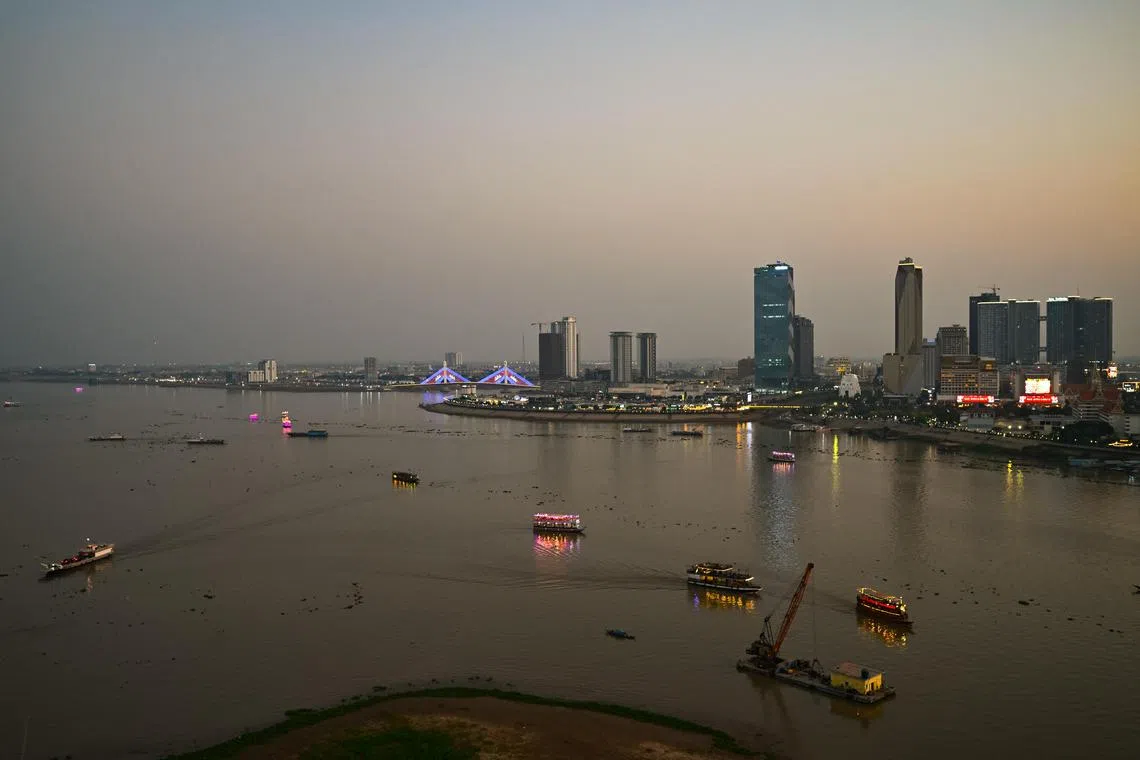Hun Sen denies Cambodia canal project could facilitate Chinese military access
Sign up now: Get insights on Asia's fast-moving developments

Cambodian PM Hun Sen denied suggestions that the project could facilitate the entry of Chinese naval ships up the Mekong River.
ST PHOTO: LIM YAOHUI
BANGKOK - Cambodian Senate President Hun Sen on April 9 denied recent suggestions that an upcoming navigation canal project through the country’s south could facilitate the entry of Chinese naval ships up the Mekong River.
“Why would Cambodia bring Chinese troops into its country, which violates the Constitution? And why would China bring its troops to Cambodia, which is contrary to the principle of respect for Cambodia’s independence?” he wrote on the platform X.
Cambodia envisions the US$1.7 billion (S$2.3 billion), 180km Funan Techo canal, which links Phnom Penh’s river port to the coast, as a key artery for economic growth by allowing Cambodian goods to bypass Vietnamese ports and also create jobs for the 1.6 million people living en route.
Construction of the project, which connects Kandal, Takeo, Kampot and Kep provinces, is expected to be carried out by Chinese companies under a build-operate-transfer arrangement. This would allow them to manage and profit from its operations for some 50 years in return for funding the project.
According to documents Cambodia submitted to the inter-governmental Mekong River Commission in August 2023, the canal is expected to be operational by 2028.
A March 2024 Vietnamese journal article, however, warned that the canal was a “dual-use” project
The article was authored by Mr Dinh Thien and Mr Thanh Minh, two researchers with the Oriental Research Development Institute under the Vietnam Union of Science and Technology Associations, and reproduced on the website of the People’s Public Security Political Academy on March 18.
“The locks on the Funan Techo Canal can create the necessary water depths for military vessels to enter from the Gulf of Thailand, or from Ream Naval Base, and travel deep into Cambodia and approach the (Cambodia-Vietnam) border,” it said.
Cambodia, which is upgrading its Ream Naval Base with Beijing’s help,
But the Vietnam article claimed: “The Funan Techo Canal is not simply a socio-economic project but also has major military value, which would have a strong impact on the defence and security situation of the whole region.”
This concern was among others that have surfaced recently about the proposed Cambodian canal, which had previously sparked concern about its impact on the sensitive ecology of the Mekong Delta.
Decades of dam-building and other uncontrolled development in the Mekong River have accelerated saline intrusion in the downstream rice production area.
Vietnam has overlapping territorial claims with China in the nearby South China Sea.
Hanoi has largely avoided commenting directly on the Cambodia canal project, though Cambodian media reported that Cambodian Prime Minister Hun Manet tried to assuage Vietnamese concern about it when he visited Hanoi in December 2023.
In his remarks on April 9, Mr Hun Sen, the former prime minister, stressed that Cambodia and Vietnam “are good neighbours and have good cooperation in all fields”.
The canal “purely serves socio-economic benefit as it provides more waterways to south-western Cambodia (in addition) to the existing transport routes along the Mekong River”, he wrote.
“This vital infrastructure facilitates agricultural activities by providing water for crop cultivation, is good for water management during the rainy season, and increases freshwater fish production, among other benefits,” he wrote.
He added that the canal would have no impact on water flow in the Mekong River.



